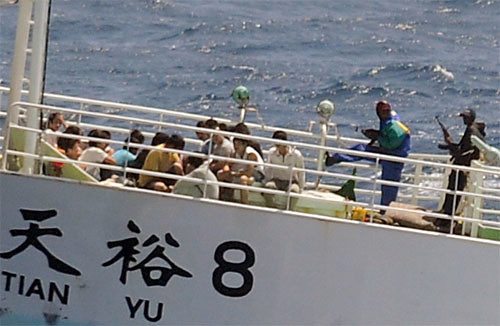MARK JOSEPH UBALDE, GMANews.TV
MANILA, Philippines - The sea was peaceful that moonless evening of June 2006. Filipino seafarer Alfonso Constantino was on duty aboard the MV Sea Epoch, a Panamanian-flagged ship carrying coal from the Middle East to Asia.
As the carrier cruised smoothly off Somalia’s coast toward the Gulf of Aden, Alfonso noticed that the ship’s radar picked up three small vessels speeding behind.
“Through the telescope I could see them getting closer to the ship," Alfonso said. “At that point I said, ‘This is it, the pirates will hijack us.’"
Alfonso rushed to notify the ship’s Filipino captain, who immediately gave the command to sound the vessel’s warning siren. But the pirates were undeterred.
Speeding at 16 nautical miles per hour in the calm African waters, the fishing boats easily caught up with the ship.
The captain told Alfonso and the rest of the predominantly Filipino crew to assemble at the end of the ship and show their full force on the pirates.
“Some of us were shouting. Others waved broomsticks and thick wood slabs. The captain readied the fire house in case one of them gets stupid and decides to board the ship," he said.
An hour later, the 22-man crew managed to breathe a sigh of relief as the pirates of Somalia gave up and disappeared in the darkness.
Others aren’t as lucky as Alfonso.
Israel Lumpas, one of the two kidnapped seafarers on board the Japanese cargo ship MT Stolt Valor said his 62-day captivity in Somalia might have scarred him for life.
“It will take years for me to get over the harrowing experience," Lumpas, told online news site Khaleej Times before his scheduled return to Manila on Tuesday (November 25) evening.
Lumpas, 28, was kidnapped last September 15 when about 20 heavily-armed pirates boarded his ship and commandeered the vessel back to Somali shores.
“We were all very scared. They did not harm us, but kept threatening us. They were wielding AK47 rifles and carrying dozens of grenades, looked very fearsome and mean," he said.

Pirates guard the crew of the Chinese fishing vessel FV Tianyu 8 as it sails through the Indian Ocean on Nov. 13. Three Filipino seafarers are on board the ship. US Navy
Unfortunately, 134 Filipino seafarers on board eight ships remain captive in Somalia.
The numbers are not surprising as Filipinos are present in all of the world’s ships. Philippine Department of Foreign Affairs executive director Crescente Relacion said one-third of the world’s shipping manpower requirement or an estimated 350,000 seafarers are supplied by Filipinos.
"This puts them at a very high risk (to abductions)," Relacion told GMANews.TV.
As the number of attacks continues to climb to alarming levels, the Philippine government has seen allies in other countries to put an end to the hijackings in the Horn of Africa.
But as the international community maintains to approach the issue of piracy with non-violent tactics, and the willingness of wealthy ship owners to pay millions in ransom, the Somali pirates remain to be a curse to Filipino seafarers.
No comments:
Post a Comment